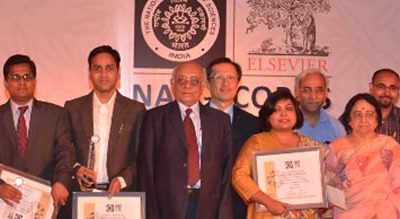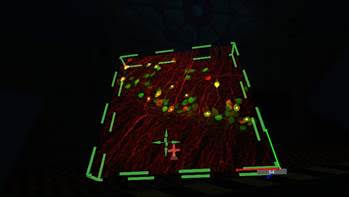New Delhi, September 22, 2015 – Elsevier, a world-leading provider of scientific, technical and medical information products and services in print and electronic forms, and the National Academy of Sciences, India (NASI), today announced the winners of the 2015 NASI-Scopus Young Scientist Awards.
More than 100 guests representing the best from India’s scientific community attended the awards ceremony – now in its sixth year of inception – held at the Hyatt Regency, New Delhi.
Dr. R. Chidambaram, principal scientific adviser to the government of India and chairman of the Science Advisory Committee to the Cabinet, presented the awards to this year’s winners.
The NASI-Scopus Young Scientist Awards program attracted more than 600 entries this year from premier research institutions across India. Elsevier provided quantitative analyses using data from Scopus, the largest abstract and citation database of peer-reviewed literature.
The applications were judged by a panel of 32 subject experts from India’s academic community on such criteria as:
- Quality and number of publications
- Nature and uniqueness of research
- Outcomes of research
- Impact on society
- Vision of the researcher
Special consideration was also given to novel and innovative ideas with the potential for research commercialization. The winners of the 2015 Elsevier – NASI-Scopus Young Scientist Awards are:
Agriculture
Dr. Gnanavel Venkatesan
Scientist
Indian Veterinary Research Institute, Nainital
Dr. Swarup K. Parida
Staff Scientist
National Institute of Plant Genome Research, New Delhi
Biological Sciences
Dr. Suvendra Nath Bhattacharyya
Principal Scientist
CSIR-Indian Institute of Chemical Biology, Kolkata
Chemistry
Dr. Subi Jacob George
Associate Professor
Jawaharlal Nehru Centre for Advanced Scientific Research, Bangalore
Earth, Oceanographic & Environmental Sciences
Dr. Tarun Gupta
Associate Professor
Indian Institute of Technology, Kanpur
Engineering
Dr. Subhransu Ranjan Samantaray
Assistant Professor
Indian Institute of Technology, Bhubaneswar
Mathematics
Dr. UK Anandavardhanan
Associate Professor
Indian Institute of Technology, Mumbai
Medicine
Dr. Rajnish Kumar Chaturvedi
Scientist
CSIR-Indian Institute of Toxicology Research, Lucknow
Physics
Dr. G. V. Pavan Kumar
Assistant Professor
Indian Institute of Science Education & Research, Pune
Social Sciences
Dr. Subharati Ghosh
Assistant Professor
Tata Institute of Social Sciences, Mumbai
“NASI Scopus Young Scientists awards are now considered as a premier recognition of hard work, innovations and aspirations of young scientists of India,” said Professor Akhilesh Tyagi, President, National Academy of Sciences, India.
He added: “We are proud to associate with Elsevier for these awards as they encourage healthy competition, instill confidence and help establish credibility of first steps taken in the pursuit of scientific excellence.”
“I congratulate this year’s winners who continue to advance research excellence in India and all around the world,” said Youngsuk “Y.S.” Chi, Chairman of Elsevier. At Elsevier we are honored to support these award recipients and other stakeholders across the Indian scientific community with highest quality content and cutting edge digital solutions. We are thrilled to be part of this exciting time for Indian science, and tonight’s event is a celebration of this country’s commitment to driving forward innovation and growth through research.”

2015 Young Scientist Awardees – From left to right: Dr. Swarup K. Parida; Dr. Gnanavel Venkatesan; Dr. Suvendra Nath Bhattacharyya; Dr. Subhransu Ranjan Samantaray; Dr. Rajnish Kumar Chaturvedi; Dr. R Chidambaram, Principal Scientific Advisor to the Government of India and Chairman of the Scientific Advisory Committee to the Cabinet; Mr Youngsuk Chi, Chairman of Elsevier; Dr. Subharati Ghosh; Prof. Akhilesh K. Tyagi, President of NASI; Dr. Manju Sharma, Chair of the NASI-Distinguished Women Scientists; Dr. G.V. Pavan Kumar, Dr. Subi Jacob George; Dr. Tarun Gupta and Dr. U.K. Anandavardhanan.
Elsevier first launched the Scopus Young Scientist Awards in 2006. In India, the program was officially institutionalized within its scientific community through Elsevier’s collaboration with NASI in 2009. The program honors young researchers who are building their careers in academic research and helps them gain recognition of their work.
About National Academy of Sciences, India (NASI)
Founded in the year 1930, the National Academy of Sciences, India is the oldest Science Academy of the country and is located at Allahabad. The main objective of the Academy was to provide a national forum for the publication of research work carried out by Indian scientists and to provide opportunities for exchange of views among them.
About Scopus
Scopus is the largest abstract and citation database of peer-reviewed literature and features tools to track, analyze and visualize scholarly research. Its comprehensive database contains 55+ million items indexed from 21,000 titles from more than 5,000 publishers worldwide, ensuring broad interdisciplinary coverage in the fields of science, technology, medicine, social sciences and arts and humanities.
Scopus was designed and developed with input from researchers and librarians and features direct links to subscribed full-text articles, other library resources and interoperability with applications such as reference management software. Scopus is part of the Elsevier Research Intelligence portfolio which includes the SciVal tools, the Pure system, rich data assets and custom Analytical Services.
About Elsevier
Elsevier is a world-leading provider of information solutions that enhance the performance of science, health, and technology professionals, empowering them to make better decisions, deliver better care, and sometimes make groundbreaking discoveries that advance the boundaries of knowledge and human progress.
Elsevier provides web-based, digital solutions — among them ScienceDirect, Scopus, Elsevier Research Intelligence and ClinicalKey— and publishes more than 2,500 journals, including The Lancet and Cell, and more than 33,000 book titles, including a number of iconic reference works. Elsevier is part of RELX Group plc, a world-leading provider of information solutions for professional customers across industries.www.elsevier.com.






